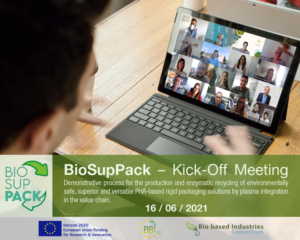
BioSupPack project supported by EUBP
The EU-funded BioSupPack project, supported by European Bioplastics (EUBP), is geared towards contributing to the European bio-based circular economy by developing polyhydroxyalkanoate (PHA)-based packaging solutions derived from residues. It is a viable recycling process for these bio-based plastic materials to make sure resources stay in the loop. On 16 June 2021, the 3.5-year project was officially launched during a virtual kick-off meeting, bringing together 17 partners from 8 countries. BioSupPack receives funding from the Bio-Based Industries Joint Undertaking (BBI-JU) and Horizon 2020 framework.
During the event, Ms Ruiz Sierra from the BBI-JU emphasized the critical role of projects, such as BioSupPack, in fostering collaboration among diverse stakeholders and pooling expertise to achieve the European Commission’s European Green Deal goals: “BioSupPack is an excellent example of how research and innovation can address the current challenges that are threatening our world and society and it can contribute to the European Green Deal goals. The project will deliver green and circular solutions by transforming agro-food industry by-products into bio-based packaging solutions while addressing the recyclability of end products. At BBI-JU, we have put many hopes into this demo project. We are sure that your work during the next years will be crucial towards the expansion of new bio-based packaging solutions in Europe while ensuring environmental protection.”
Coordinated by the plastics technology institute AIMPLAS (Spain) and equipped with a budget of 8.8 million Euro, BioSupPack will develop a demonstrative process for the production and enzymatic recycling of environmentally safe, superior, and versatile rigid packaging solutions based on the novel bio-based polymer family of PHAs.
In several interlinked working groups, the project consortium partners will obtain PHAs from brewer’s spent grain and other monomers from enzymatic recycling of PHA packaging waste. Based on these PHA compounds, several rigid packaging prototypes with specific barrier properties will be designed at a pilot scale and tailored towards the feasible waste collection and separation options. The packaging solutions will include injection-moulded PHA and biocomposites demonstrators as well as PHA-coated fibre-based service packaging and ready meal trays.
Eventually, the project partners will develop an enzymatic recycling process for recovering the PHA from these new packaging solutions, demonstrating the feasibility of upcycling post-industrial waste within the production process. The prototypes will be assessed regarding their environmental and socio-economic sustainability as well as the safety of the new bio-based packaging.
Learn more about the BioSupPack here.